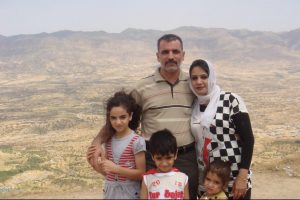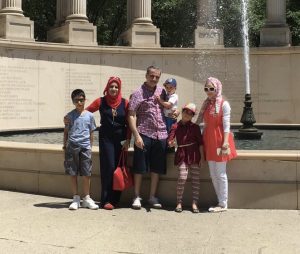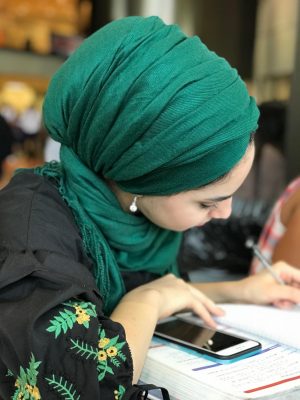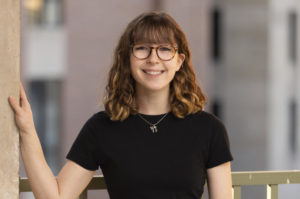Rawan Alsaedi contemplates going home to a war zone
April 2, 2018

As sophomore Rawan Alsaedi stepped off of the plane at the Chicago O’Hare International Airport in July of 2013, she thought she would never feel at home here, but now she couldn’t imagine living anywhere else.
That year, Rawan and her family left war-torn Iraq for her father Abdulrahman’s studies. He came here with his family with hopes for a better education for himself and his children after he was accepted at Western Michigan University to pursue his PhD in computer science. “The government offers opportunities for people with a masters degree to go outside the country and get their PhD,” she says, explaining how her dad was able to come to the US to study. While it is a remarkable opportunity, it is also a tedious process: the paperwork itself took a year to complete.

Since the government has given Rawan’s father this opportunity, he must agree to come back to Iraq after finishing his studies and work there for twice as many years as he was in the US before he will be allowed to move out of the country. “If our family refuses to go back, the government will either take our house or take away the job of the people that signed the agreement in assurance that we would come back to Iraq. The last option would be to pay back all of the money the government spent for my education here, which is around 400 to 500 thousand dollars,” says Abdulrahman.
Their visa only allows them five years in the US and their time here is coming to an end. Alsaedi’s family has already extended their visa, but it will only give them another year, meaning they will be going back sooner rather than later. Although they are excited to see their family and friends back in Iraq, they regret having to leave behind the life that they have worked so hard to build here: especially Rawan.
Unlike when she first moved here, Rawan’s entire life is now here in America and she is reluctant to leave it, along with the memories and friends she has made. “If I go back, my future might not be as successful as I want it to be since I’m losing a lot of Arabic and high school there is very hard. Since my Arabic isn’t very good, my GPA will drop, meaning that I won’t have as good of a chance to get into a good college in Iraq or be able to come to the US for college,” she explains.
Her brother Moamel, 6th grader at North Middle School, voices similar concerns: “Moving back will give me a lower quality of education by forcing me to learn in a language that I have started to forget,” he says. Although there are schools that teach in English, they are extremely expensive and some of them don’t have a curriculum that is even close to as rigorous as US schools or top Arabic-only schools.

In addition to her concerns about her education, Rawan is worried that Iraq isn’t the same as it was when she left it. Her country was already riddled with destruction from war when she left, and the last 4 years have seen the country locked in a bitter civil war with no apparent end.
If she had it her way, Rawan would like to stay in the United States to finish her education and then go back afterwards. Portage Northern staff have been working to make this dream a reality: counselor Shari Smith has helped her understand how scholarships can help her citizenship status, and Rawan is now focused on applying for scholarships that would allow her to stay in the U.S. Theoretically, if she gets a scholarship that is big enough, then her presence in America would be legal even after her visa expires because she would no longer be here for her father’s studies, but her own. Her visa would then be renewed by the government until her education is done, at which point she could apply for a green card and work towards getting her citizenship if that was her desire.
While she is still working out the details, Rawan has been working tirelessly towards her scholarship aspirations by doubling up on math classes, studying hard for the SAT, and maintaining her perfect GPA. She will start applying for these scholarships along with college in the fall, when she starts her junior year at Portage Northern High School.
In many ways, Rawan Alsaedi is just a normal sophomore who has dreams for her future and her goals set out in front of her. In other ways, her fighting spirit and work ethic will define not just her next two years, but the rest of her life, more greatly than her peers. Wherever the future takes her, one thing is for sure: she has the will, and where there’s a will, there’s a way.







